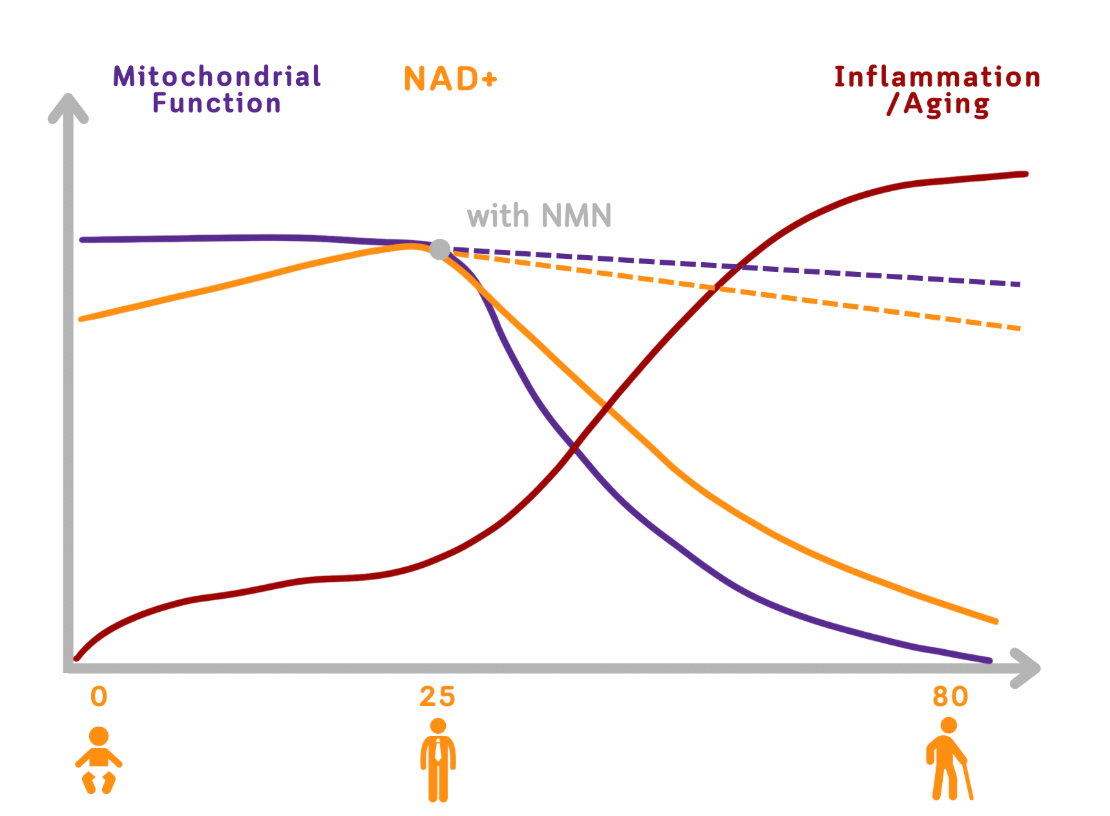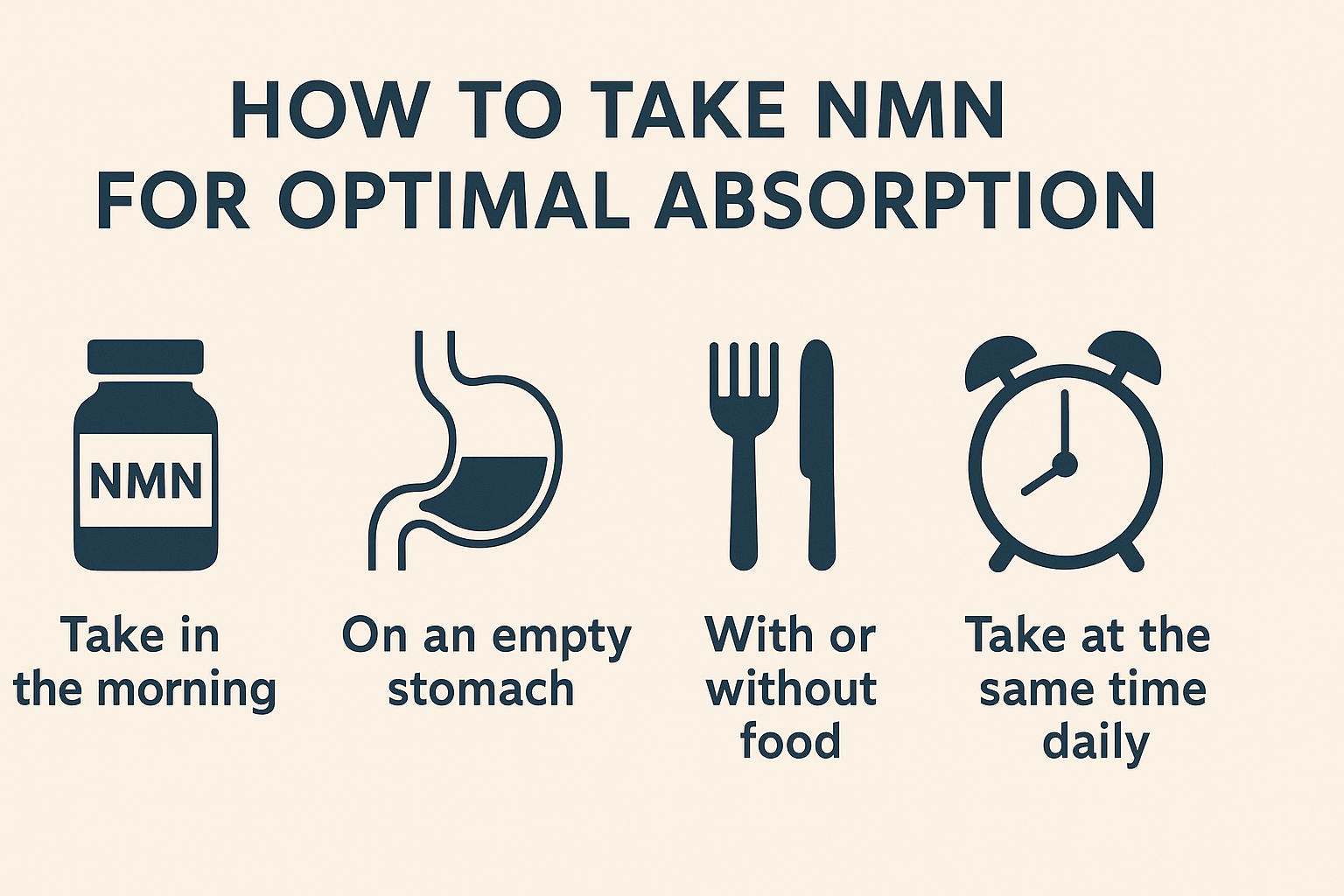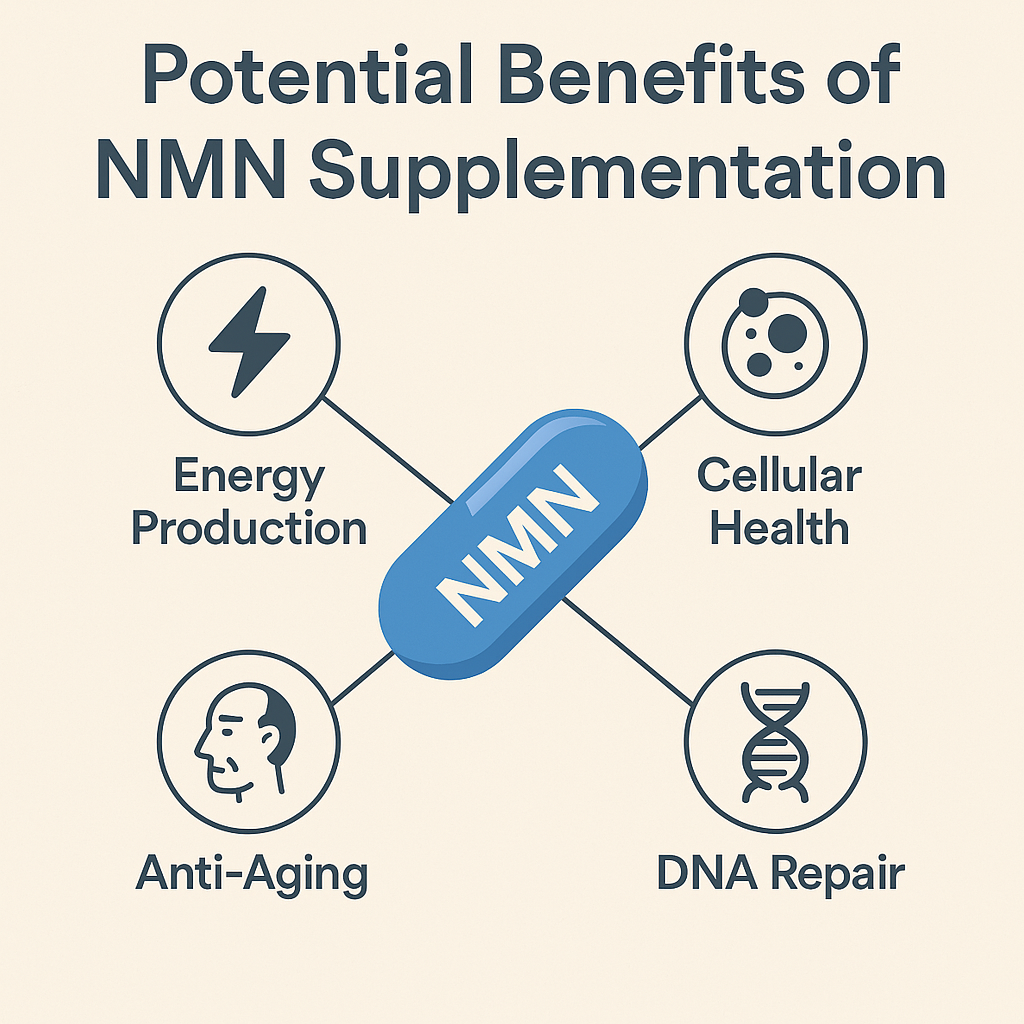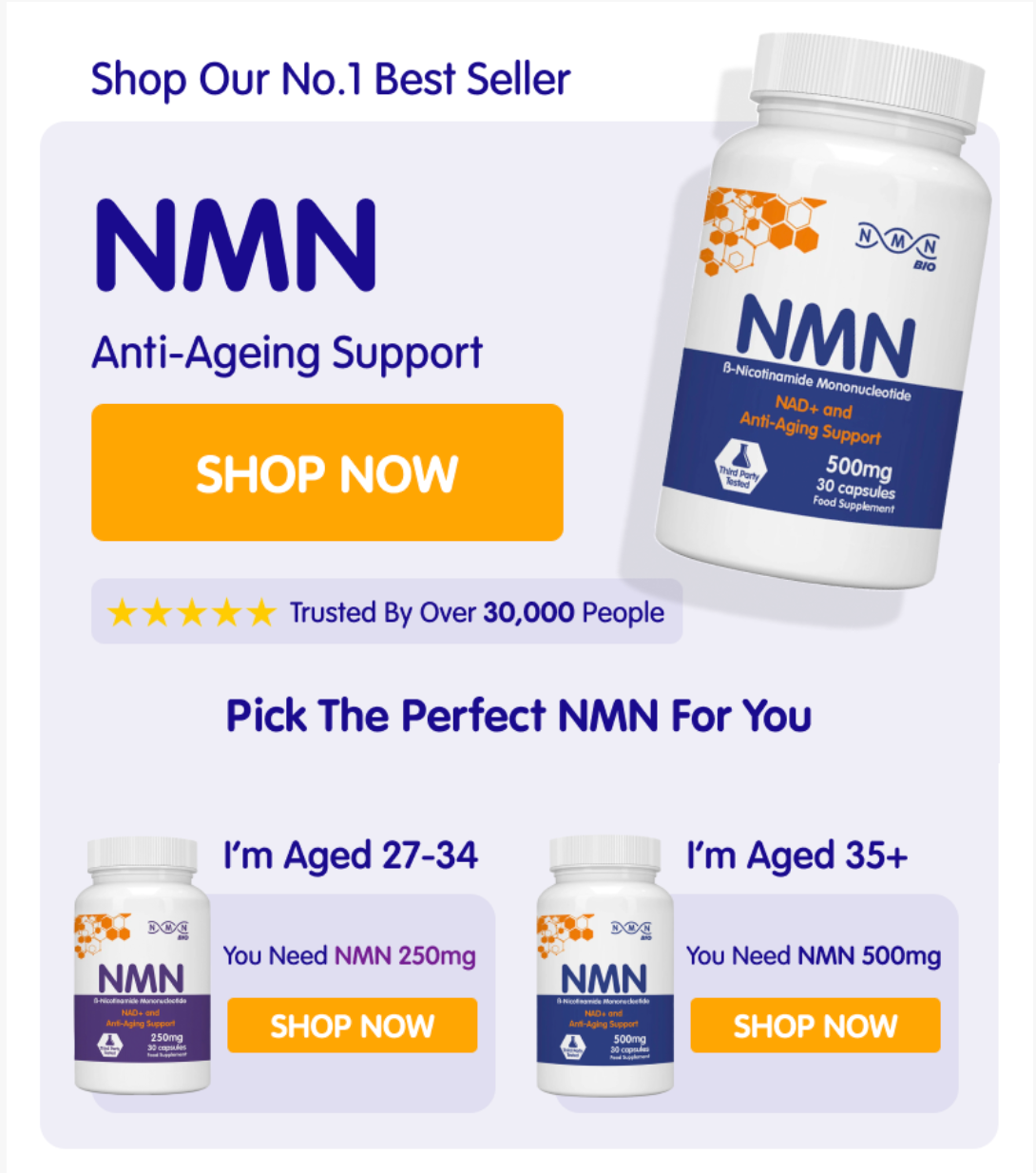Optimal NMN Dosage for Maximum Health Benefits in 2025

Optimal NMN Dosage for Maximum Health Benefits in 2025
Looking for the optimal NMN dosage to optimize your health? NMN (Nicotinamide Mononucleotide) is vital for cellular energy and aging. This guide will outline the best dosages based on latest research, adjusted for different ages and health goals. Read on to find your ideal NMN intake.
Key Takeaways
-
Nicotinamide Mononucleotide (NMN) is crucial for cellular functions, energy metabolism, and DNA repair, making its supplementation significant for health maintenance, especially with aging.
-
The recommended daily dosage for NMN ranges from 250 mg to 900 mg, with higher doses for older adults (500-1000 mg) to maximize benefits related to metabolic health and physical performance.
Understanding NMN and Its Role in Health

Nicotinamide Mononucleotide (NMN) is a naturally occurring molecule that plays a vital role in supporting cellular energy and overall vitality. As a direct precursor to Nicotinamide Adenine Dinucleotide (NAD+), NMN is swiftly converted into NAD+ inside cells. This conversion is crucial, as NAD+ is a coenzyme involved in essential biological processes such as energy metabolism, DNA repair, cellular ageing, and mitochondrial function.
However, the levels of both NMN and NAD+ decline significantly with age, leading to reduced cellular function and a higher risk of age-related health issues. Supplementing with NMN has been shown to effectively increase NAD+ levels, helping to counteract the effects of ageing and support healthy longevity. This makes NMN supplementation an increasingly popular strategy in the field of anti-ageing and metabolic health.
Beyond energy production, NMN supports metabolic pathways, enhances cellular resilience, and contributes to maintaining the structural integrity of cells. Its potential benefits include improved mitochondrial health, better insulin sensitivity, and protection against oxidative stress, factors that are vital for preventing metabolic disorders and promoting long-term health.
Given NMN’s critical function in maintaining cellular health, understanding how it works and why it becomes increasingly important with age empowers individuals to make informed decisions about supplementation.
Recommended NMN Dosage Based on Current Research
Current research has shown that physical performance, as determined by walking tests, improved significantly in groups taking 300 mg, 600 mg, and 900 mg of NMN compared to a placebo group.
In clinical studies, doses of 600 mg and 900 mg resulted in the highest blood NAD concentrations, suggesting that these dosages are effective in significantly boosting NAD+ levels. However, it’s important to note that the starting dose for NMN supplementation is typically 250 mg daily, allowing individuals to gauge their response and adjust accordingly.
The range of effective NMN doses based on studies is between 250 mg to 1200 mg daily. This wide range allows for flexibility in tailoring the dosage to individual needs and health conditions. Consulting a healthcare professional can help determine the optimal dosage for specific health goals and conditions.
For middle-aged adults, daily oral doses investigated in clinical trials included 300 mg, 600 mg, and 900 mg. These dosages were found to be effective in enhancing physical performance and metabolic health. Clearly, NMN supplementation can be a valuable tool for promoting health and longevity.
Effective NMN Dosages for Different Age Groups
When it comes to NMN supplementation, age-specific dosing is essential. As we grow older, NAD+ levels gradually decline, which can impact energy, metabolism, and cellular repair. Tailoring NMN intake to your age group helps maximise its benefits and supports healthy ageing more effectively.
For adults under the age of 35, a lower dose is typically sufficient. It’s recommended to start with 250 mg of NMN per day. After one to two weeks, this can be increased to 500 mg daily if tolerated well and further benefits are desired. NMN is best taken in the morning, ideally on an empty stomach to enhance absorption, although it can also be taken with food if preferred. The key to results is consistency—taking it at the same time each day helps maintain stable NAD+ levels and supports the body’s natural rhythm.
For those aged between 35 and 60, the body’s NAD+ production declines more noticeably. At this stage, a starting dose of 500 mg per day is generally recommended. After one to two weeks, increasing the dosage to 1,000 mg per day can offer additional benefits, particularly in improving insulin sensitivity, physical performance, and energy metabolism. Again, morning is the optimal time for consumption, and regular daily use is advised to maximise outcomes.
For adults over the age of 65, NMN becomes particularly important due to more significant physiological changes and cellular decline. A daily dose of 750 mg to 1,000 mg is often recommended, depending on the individual’s health status and goals. At this level, NMN can support muscle insulin sensitivity, improve sleep quality, and boost overall vitality, helping to mitigate the effects of age-related metabolic decline. Given the higher dosage, it's especially important for older adults to monitor how they feel and, where possible, consult a healthcare professional to determine the most appropriate amount.
No matter your age group, consistency and timing are important. Taking NMN at the same time each morning helps stabilise NAD+ levels and align with your body’s natural energy cycles. Understanding your personal needs and adjusting your NMN dosage accordingly can go a long way in supporting long-term health, performance, and healthy ageing.
Safety and Tolerability of NMN Supplementation
The safety and tolerability of NMN supplementation have been extensively studied. Clinical trials have shown that NMN up to 1250 mg daily is considered safe for healthy adults. The safety profile of NMN has been supported by studies showing no serious adverse events reported among participants.
Adverse events were monitored throughout the NMN supplementation trials, with no significant findings. This indicates that NMN is generally well-tolerated across various dosages. No significant adverse effects were reported up to a daily intake of 900 mg, further supporting its safety.
Research indicates that NMN is typically metabolized effectively without causing significant clinical symptoms. NMN was well tolerated in clinical trials, revealing minimal side effects. No adverse events were reported among participants in the 600 mg and 900 mg groups.
Clinical evaluations found no clinically meaningful abnormalities among participants taking NMN. However, no studies have been conducted on the long-term effects of NMN usage, emphasizing the need for further research. Doses being tested for long-term administration in ongoing clinical trials range from 200 to 300 mg/day.
Understanding NMN’s safety and tolerability, the next step is to explore optimal absorption methods to maximize health benefits.
How to Take NMN for Optimal Absorption

To get the most out of NMN supplementation, how and when you take it matters. Several methods of administration can impact how efficiently NMN is absorbed and converted into NAD+.
One of the most effective methods is sublingual administration—placing NMN powder under the tongue. This allows it to bypass the digestive system and enter the bloodstream more directly, leading to faster absorption. However, oral supplementation—whether in capsule or powder form—has also proven effective. This is thanks to a specific NMN transporter in the small intestine (Slc12a8), which helps deliver NMN into cells for NAD+ synthesis.
For optimal absorption, it’s best to take NMN in the morning on an empty stomach. This not only enhances bioavailability but also aligns with the body’s natural circadian rhythm, supporting mitochondrial function and daily energy production. If taking NMN with food is more convenient, it can still be effective—though absorption may be slightly reduced depending on meal composition.
Some research suggests that pairing NMN with healthy fats—such as those found in avocados, eggs, or MCT oil—might further enhance absorption. While NMN has a phosphate group that makes it larger than other NAD+ precursors like Nicotinamide Riboside (NR), the body has mechanisms to transport it effectively. That said, some scientists propose that NMN may be partially converted into NR before crossing the cell membrane, where it is then transformed into NAD+.
Ultimately, understanding how your body absorbs and utilises NMN can help you fine-tune your supplementation for maximum benefit.
Potential Benefits of NMN Supplementation

NMN supplementation offers a wide range of potential health benefits. Studies suggest that NMN may help in improving insulin sensitivity and combating diabetes-related issues. NMN supplementation has also been linked to enhanced mitochondrial function and increased physical activity in aging models. Users of NMN often report increased energy levels and improved mental clarity after consistent use. Research indicates that taking NMN could promote improvements in metabolic functions as we age, making it a valuable tool for promoting overall health and longevity.
The potential benefits of NMN supplementation extend beyond just physical health. Enhanced cognitive abilities and reduced risk of neurological conditions are among the reported benefits of NMN. Understanding these benefits can help individuals make informed decisions about NMN supplementation.
Real-Life Examples of NMN Usage
Real-life examples of NMN usage underscore its potential impact on health and well-being. In human studies, NMN has shown promise in enhancing insulin sensitivity in individuals with prediabetes, making it a promising intervention for metabolic disorders. Specific NMN doses have also been linked to improved heart function and reduced fatigue, proving to be a valuable addition to many health regimens.
In terms of physical performance, NMN supplementation has been associated with notable improvements. Research suggests that NMN can enhance physical endurance during exercise, enabling individuals to sustain higher levels of physical activity and boost overall fitness. This is particularly advantageous for athletes and those seeking to elevate their exercise routines.
Prominent figures have also advocated for NMN due to its potential health benefits. David Sinclair, a renowned Harvard researcher, has self-reported significant improvements in his lipid profile and energy levels after using NMN. Celebrities like Kendall Jenner and Hailey Bieber have publicly endorsed NMN, highlighting its potential to enhance health and vitality.
The growing interest in NMN supplements among researchers and celebrities highlights its potential health benefits and usage patterns. These real-life examples provide valuable insights into the practical applications of NMN supplementation and its impact on health.
Factors Influencing NMN Dosage
Several factors can influence the appropriate NMN dosage for individuals. Body weight is a significant factor, with heavier individuals potentially needing higher amounts of NMN to achieve the desired health benefits. Specific health objectives, such as increasing energy or cognitive support, can also guide the appropriate NMN dosage for individuals.
Individuals with existing health conditions or on medication should consult a healthcare professional to determine their optimal NMN dosage. This ensures safe and effective supplementation, considering any potential interactions with medications or underlying health issues.
Adjustments to NMN dosage may be necessary based on individual needs and responses to supplementation. Monitoring the effects of NMN and making necessary adjustments can help achieve the best possible health outcomes. This personalized approach to NMN supplementation ensures that individuals can tailor their dosage to their specific health goals.
Summary
In summary, NMN supplementation offers significant potential health benefits, especially as we age. Understanding the optimal NMN dosage based on current research is crucial for maximizing these benefits. NMN plays a vital role in maintaining cellular functions, enhancing energy metabolism, and promoting healthy aging.
The recommended NMN dosages vary based on age and individual health conditions, however these are the recommend guideline to start with.
While NMN optimal dosages can vary depending on age, lifestyle, and individual health conditions, the following are general guidelines to help you get started:
For individuals under 35:
Begin with 250 mg per day.
After 1–2 weeks, gradually increase to 500 mg per day if well-tolerated.
For individuals over 35:
Start with 500 mg per day.
After 1–2 weeks, increase to 1,000 mg (1 gram) per day to support energy, metabolism, and healthy ageing.
Timing and Absorption Tips:
-
Take NMN in the morning to align with your body’s natural circadian rhythm.
-
Ideally, take it on an empty stomach to enhance absorption.
-
It can also be taken with food if preferred.
-
For best results, take NMN at the same time each day to maintain consistent NAD+ levels.
Always listen to your body and consult a healthcare professional before making changes to your supplement routine.
Ready to experience the benefits for yourself?
Shop high-purity NMN now and start your longevity journey today.
 Researched and reviewed by Dr Elena Seranova, Ph.D.
Researched and reviewed by Dr Elena Seranova, Ph.D.
Dr Seranova holds a master's degree in Translational Neuroscience from the University of Sheffield, UK, and a Ph.D in Stem Cell Biology and Autophagy from the University of Birmingham, UK. She is a published author in multiple peer-reviewed journals, including Cell Reports and Developmental Cell.
Frequently Asked Questions
What is the recommended starting dose for NMN supplementation?
The recommended starting dose depends on your age. For individuals under 35, it's advised to begin with 250 mg per day, increasing to 500 mg after 1–2 weeks if well-tolerated.
For those over 35, the typical starting dose is 500 mg per day, with the option to increase to 1,000 mg per day after 1–2 weeks to support energy, metabolism, and healthy ageing. For optimal absorption, NMN is best taken in the morning on an empty stomach, at the same time each day.
Is NMN safe for long-term use?
NMN appears to be safe for long-term administration at doses up to 1250 mg daily, with minimal side effects reported. Nevertheless, further research is necessary to fully understand its long-term effects.
Can NMN improve physical performance?
NMN supplementation can improve physical performance by enhancing endurance during exercise. Therefore, incorporating NMN may be beneficial for those looking to boost their physical capabilities.
What factors should be considered when determining NMN dosage?
When determining NMN dosage, it is essential to consider factors such as age, body weight, health objectives, and existing health conditions. These elements will help ensure the dosage aligns with individual needs.
How should NMN be taken for optimal absorption?
A: For best absorption, NMN should be taken in the morning on an empty stomach. This helps maximise its bioavailability and supports the body’s natural NAD+ production cycle. While NMN can also be taken with food if preferred, taking it on an empty stomach is ideal. For consistent results, it’s recommended to take NMN at the same time each day.



